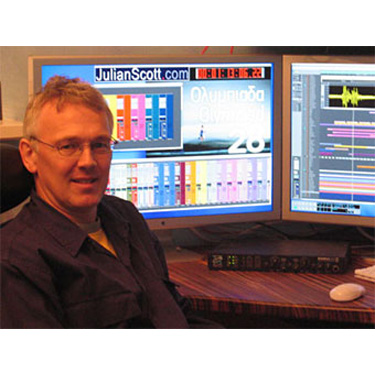|
 Julian Scott creates world-class soundtracks for cinema, television, and special projects. Julian's unique approach to composition combines music with effects and sound design - everything from experimental sound synthesis, to a full blooded symphonic score. Visit www.julianscott.com for more information about his work. Julian Scott creates world-class soundtracks for cinema, television, and special projects. Julian's unique approach to composition combines music with effects and sound design - everything from experimental sound synthesis, to a full blooded symphonic score. Visit www.julianscott.com for more information about his work.
LONDON, UNITED KINGDOM: English composer Julian Scott's unique approach to film, television and special projects, in which he combines sound design and effects with music, has brought his work to a world stage for numerous unique projects. Most recently, Scott produced the soundtrack for the entire Opening and Closing Ceremonies of the Summer Olympic Games in Athens, Greece, during which Metric Halo's Mobile I/O 2882 and ULN-2 played critical roles.
"It seemed very easy to have a unit that was self-powered, so you could, quite simply, take a Firewire cable, bang it into the back of a computer, boot up Logic, and even if you weren't in a recording studio, you'd still have all you effectively needed to hear and edit your material," explains Scott. "That simplicity is fantastic. And the fact that's it's portable, and you can put it in a backpack with the laptop, is a benefit."
That portability came in very useful for one particular field recording, he reveals. "We used the ULN-2 for some high-definition recording, which was done to stereo. Specifically, we went to a monastery in Greece with a completely exposed bell tower. Everything had to be winched up - an Apple laptop, a couple of Neumann TLM170s, and the ULN-2. We got a fantastic recording and the ULN-2 performed perfectly."
But it was the MIO 2882 that played a key role in the production of the ceremonial soundtracks, a lengthy process that began at the end of May 2003, with long periods of recording in Greece. "We were utilizing the 2882 for pretty much everything we were doing, as well as all of our analog requirements. During all our mixing and editing, we utilized the 2882 so that we could rely on what we were hearing."
Scott, who has been using Metric Halo for several years, has come to rely on the quality, ease of use, and reliability of the gear. "It really worked well when we were mixing in three or four different locations at one time and transferring sessions. We'd send across a hard disk with various setups, utilizing the 2882, sometimes the 2882+DSP, and it would just load into Core Audio on the Mac."
The audio quality is especially important to Scott. "It does sound great. There's an element of surprise there because, from a professional point of view, it's not a particularly expensive kit. But we did get a lot of comments about how nice things were sounding."
Paul Stefanidis, an Athens-based engineer who acted as soundtrack production supervisor, recording and mixing much of the material, comments, "I'm very impressed with the converters on the 2882. The DSP is also great. It's a very impressive box," he considers, adding, "and the ULN is even better."
Stefanidis, who worked with Scott for the entire project, was so impressed with the Metric Halo equipment, he says, "I bought a couple of these units. And now a lot of people here are getting interested through me in these interfaces."
The only situation in which the Metric Halo units were not pressed into service was during recording sessions in Athens, especially at the Concert Hall, which utilized a high-end digital console. But the ability to always have an MIO on hand, notes Scott, proved a lifesaver on one occasion. Needing a massed drum sound for one particular piece, the team were recording ten drummers outdoors in a natural amphitheater using a Greek remote truck when, recalls Scott, "It got to 5 o'clock and the mobile unit went - they had a prior engagement!"
Scott's production assistant suggested setting-up the Metric Halo rig. "So we rigged a G5 inside our van, dug the MIO out of the rucksack, and in half-an-hour we were recording again. Two of the main sequences in the show were recorded on the MIO in the van. The quality was actually better, because we'd lost the desk, so we were going straight from the microphones, which were powered by the MIO, into Logic."
When he was initially considering what equipment to use on the Olympics project, he says, "We definitely wanted to avoid having a huge amount of hardware locked on the back of a computer. It wasn't a cost issue, more a fact of portability and setting up different systems. The fact that Metric Halo is portable, yet we were not sacrificing quality, and in certain cases we were gaining quality, made it an ideal situation." |